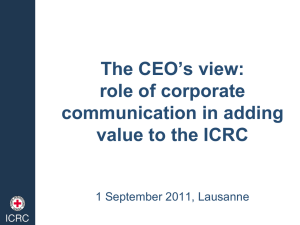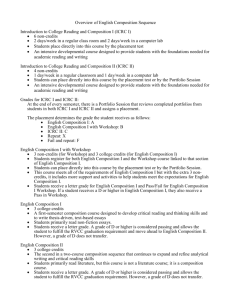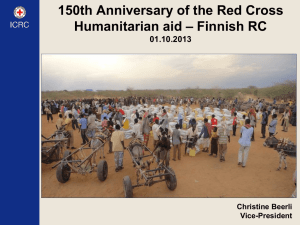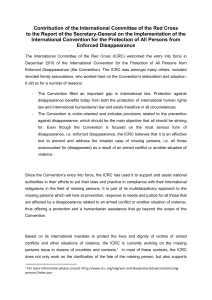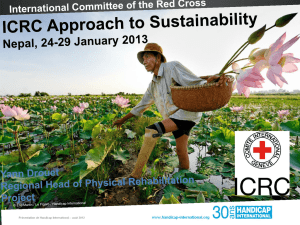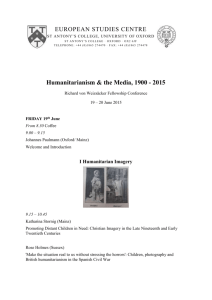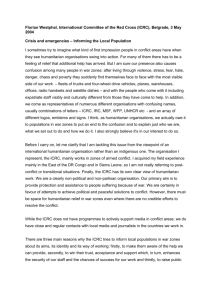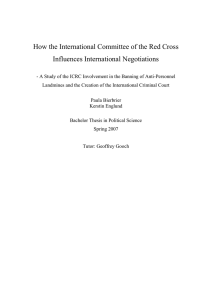International Committee of the Red Cross
advertisement
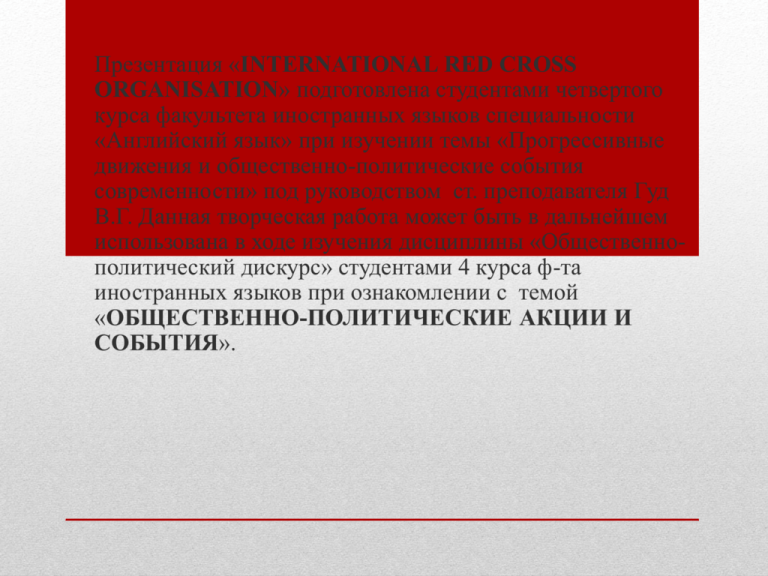
• Презентация «INTERNATIONAL RED CROSS ORGANISATION» подготовлена студентами четвертого курса факультета иностранных языков специальности «Английский язык» при изучении темы «Прогрессивные движения и общественно-политические события современности» под руководством ст. преподавателя Гуд В.Г. Данная творческая работа может быть в дальнейшем использована в ходе изучения дисциплины «Общественнополитический дискурс» студентами 4 курса ф-та иностранных языков при ознакомлении с темой «ОБЩЕСТВЕННО-ПОЛИТИЧЕСКИЕ АКЦИИ И СОБЫТИЯ». International Committee of the Red Cross The International Committee of the Red Cross (ICRC) is a humanitarian nongovernmental institution with approximately 97 million volunteers worldwide which was founded to protect human life and health, to ensure respect for all human beings, and to prevent and alleviate human suffering, without any discrimination based on nationality, race, sex, religious beliefs, class or political opinions. The International Committee of the Red Cross headquartered in Geneva, Switzerland. • The International Committee of the Red Cross was founded on 24 June 1863 (151 years ago). • The ICRC is part of the International Red Cross and Red Crescent Movement along with the International Federation of Red Cross and Red Crescent Societies (IFRC) and 189 National Societies. It is the oldest and most honoured organization within the Movement and one of the most widely recognized organizations in the world, having won three Nobel Peace Prizes in 1917, 1944, and 1963. • State parties (signatories) to the four Geneva Conventions of 1949 and their Additional Protocols of 1977 (Protocol I, Protocol II) and 2005 have given the ICRC a mandate to protect victims of international and internal armed conflicts. Such victims include war wounded, prisoners, refugees, civilians, and other non-combatants. General information The original motto of the International Committee of the Red Cross was Inter Arma Caritas ("Amidst War, Charity"). It has preserved this motto while other Red Cross organizations have adopted others. Due to Geneva's location in the French-speaking part of Switzerland, the ICRC is also known under its initial French name Comité international de la Croix-Rouge (CICR). However, the ICRC has four official languages (Arabic, English, French and Spanish). The official symbol of the ICRC is the Red Cross on white background (the inverse of the Swiss flag) with the words "COMITE INTERNATIONAL GENEVE" circling the cross. The official mission statement says that: "The International Committee of the Red Cross (ICRC) is an impartial, neutral, and independent organization whose exclusively humanitarian mission is to protect the lives and dignity of victims of war and internal violence and to provide them with assistance." It also directs and coordinates international relief and works to promote and strengthen humanitarian law and universal humanitarian principles. Mission The core tasks of the Committee, which are derived from the Geneva Conventions and its own statutes are: to monitor compliance of warring parties with the Geneva Conventions; to organize nursing and care for those who are wounded on the battlefield; to supervise the treatment of prisoners of war and make confidential interventions with detaining authorities; to help with the search for missing persons in an armed conflict (tracing service); to organize protection and care for civil populations; to act as a neutral intermediary between warring parties. The ICRC drew up seven fundamental principles in 1965 that were adopted by the entire Red Cross Movement. They are humanity, impartiality, neutrality, independence, volunteerism, unity, and universality. • ICRC operations are generally based on International Humanitarian Law (IHL), the four Geneva Conventions of 1949, their two Additional Protocols of 1977 and Additional Protocol III of 2005, the Statutes of the International Red Cross and Red Crescent Movement, and the resolutions of the International Conferences of the Red Cross and Red Crescent. • International Humanitarian Law (IHL), Treaties and Customary Law International Humanitarian Law is a set of rules that come into effect in armed conflicts. It aims to minimize the harms of an armed conflict by imposing obligations and duties to those who participate in armed conflicts. Legal Basis • The 2010 budget of the ICRC amounts to about 1156 million Swiss francs. All payments to the ICRC are voluntary and are received as donations based on two types of appeals issued by the Committee: an annual Headquarters Appeal to cover its internal costs and Emergency Appeals for its individual missions. • Most of the ICRC's funding comes from Switzerland and the United States, with the other European states and the EU close behind. Together with Australia, Canada, Japan, and New Zealand, they contribute about 80–85% of the ICRC's budget. About 3% comes from private gifts, and the rest comes from national Red Cross societies. Funding and financial matters • The ICRC is headquartered in the Swiss city of Geneva and has external offices called Delegations in about eighty countries. Each delegation is under the responsibility of a Head of delegation who is the official representative of the ICRC in the country. • The Assembly and Presidency are two long-standing institutions. Decisions are often made in a collective way, so authority and power relationships are not set in stone. Today, the leading organs are the Directorate and the Assembly. Organization • The Directorate is the executive body of the Committee. It attends to the daily management of the ICRC, whereas the Assembly sets policy. The Directorate consists of a Director-General and five directors in the areas of "Operations", "Human Resources", "Financial Resources and Logistics ", "Communication and Information Management", and "International Law and Cooperation within the Movement". The members of the Directorate are appointed by the Assembly to serve for four years. • The Assembly (also called the Committee) convenes on a regular basis and is responsible for defining aims, guidelines, and strategies and for supervising the financial matters of the Committee. The Assembly has a membership of a maximum of twenty-five Swiss citizens. Members must speak the house language of French, but many also speak English and German as well. These Assembly members are co-opted for a period of four years, and there is no limit to the number of terms an individual member can serve. Organization The Assembly also selects, for a term of four years, one individual to act as President of the ICRC. The president is both a member of the Assembly and leader of the ICRC, and he has always been included on the Council since its formation. The President automatically becomes a member of the aforementioned groups once he is appointed, but he does not necessarily come from within the ICRC organization. Since 2012: Peter Maurer The President Thanks for your attention!
